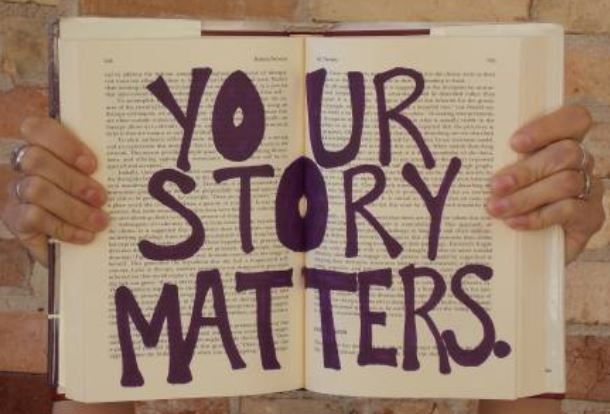
Guest post by ObstacleChick
Awareness of sexual abuse seems to be at an all-time high. Whether the stories are from the entertainment industry, religion, politics, or your neighbor next door, it seems that more and more people are telling their stories. For some people, this is the first time they have felt safe to tell their stories. It is not uncommon for people to have tried to bury their stories deep within themselves for years, decades even. Now some people are ready to open up, and it seems that sexual abuse has lain just below the surface for decades, centuries, millennia perhaps, and now it is erupting to the surface. So many of my friends are coming out with their stories, and even if they are not ready to tell the whole story, they are saying “something happened and it traumatized me.” “Hear me.” “Believe me.”
This is not my story, but it is my mom’s story, and I believe that I owe it to her to tell it.
My mom died from metastatic breast cancer in November, 2014, at the age of 71. A couple of years before she died, she told my brother, my sister-in-law and me that she had been sexually abused when she was 5 years old. She said she had told only one other person – my stepfather, who had also been sexually abused as a child. That means she waited over 30 years to tell someone (my stepdad) and over 60 years to tell anyone else. We were stunned, but a lot of things about my mom and how she raised me made a lot more sense after this revelation. (I asked my mom why she waited until after her uncle’s death to tell us, and she said she was afraid I would call the uncle and rip him a new orifice; she was not wrong in her assessment).
My mom’s abuser was her 14-year-old uncle. While my mom said he never penetrated her, he forced her to touch him and he touched her. She didn’t go into detail about the experience – I suppose that even 60 plus years later she didn’t wish to relive it. He threatened her that if she ever told anyone, everyone would think she was a bad, dirty, filthy girl. He told her that people would think she was a liar. He also warned her that if she told her parents that her daddy would kill him and that it would be my mom’s fault if her daddy went to jail. As a 5-year-old, those were scary reasons that sealed her silence. She told us that she didn’t understand what was happening but instinctively she knew that it was bad.
Growing up, my mom buried herself in books, in schoolwork, and in learning. Books were her escape from reality. I remember my mom habitually reading 2 books of fiction and one book of nonfiction at any given time, and I was amazed that she could keep them all straight. As a voracious reader myself, I can only handle either one book of fiction and one of nonfiction, or two works of nonfiction. As a high school student, my mom excelled and was one of the few female students put into advanced science and math classes. In the late 1950s and early 1960s there was a push to pursue excellence in mathematics and sciences in order to compete with the Soviet Union’s advances in those fields, particularly in regard to the space program. My mom tied with another student for salutatorian in her graduating class of about 300 students, so the school gave both students a test to determine the salutatorian. As my mom was painfully shy and terrified to give a speech at commencement, she purposely answered questions wrong so she would not become salutatorian. I asked her why she didn’t tell her guidance counselor that she did not want to give a speech instead of going through the testing, and she said she never thought of that as she always tried to do what was expected of her. My mom’s parents had not graduated from high school, though her dad had completed refrigeration training courses through the G.I. Bill and her mom got her GED just because she wanted to. My mom’s guidance counselor suggested that my mom should go to college, so as a good girl, my mom did what she was told and enrolled in Middle Tennessee State University. She completed 5 semesters before dropping out and getting married.
Everyone always remarked about my mom’s intelligence but how quiet and sweet she was. As a teenager, my mom developed ulcers. She was terrified of going out in public, especially in any situations in which she might be alone. She told me that it was torture for her to walk past the college dining hall because she had to walk past all the windows where people looking out might see her. As she grew older and needed to work, she became better at managing her extreme shyness and fear of people, of being seen, but she never outgrew it completely. When I was planning my wedding, I told my mom that I did not believe in having someone “give me away” as I was capable of making my own decisions and did not want to promote an archaic system whereby women had to be “given away” in marriage. She thought I should not buck tradition and suggested that I should ask my uncle to walk me down the aisle. Knowing her shyness, I told her that if anyone should walk me down the aisle, it should be her. She didn’t bring up my walk down the aisle again, and I happily strolled alone as a symbol of my autonomy as a human being.
Unlike the parents of most of my friends at the time, my mom taught me about sex at a very early age. For as long as I can remember, she told me to fight, run away, and tell a trusted adult if anyone ever tried to touch me in my “private” areas. We even had an identification code for which adults she trusted and which ones she didn’t; if she referred to someone as Mr. Will or Ms. Betty, those were trusted adults, but if she referred to them as Mr. or Mrs. Smith, then they were not on the approved list. My mom explained sex to me with all the appropriate body part names and where they were located when I was 6 or 7 years old. She told me that I should not tell the other kids because their parents should tell them. I was repulsed by what she was telling me, but I knew that it must be true because I had witnessed dogs copulating. After my mom told us about her sexual abuse, suddenly it made sense why she had taught me about sex with the correct terms for body parts when I was as young as I was. I don’t know if she had similar conversations with my brother, but she may have.
Other things about my mom made more sense as well, like how she seemed to be afraid of so many things. She was easily startled by sudden or loud noises. She was terrified to walk anywhere alone. Her doctor prescribed antidepressants and anti-anxiety medication, both of which helped take the edge off her irritability. My mom was in poor health most of her life, suffering from arthritis since she was in her mid-twenties in addition to a plethora of other ailments as she aged. My mom would not allow me to play sports or go too many places with friends, though there were 3 families at church with girls my age whom she trusted. She had two failed marriages, the first that lasted only a year and the second to my father, lasting only 4 years due to his emotional and psychological abuse. (In his next relationship he fathered 6 more children, and his abuse escalated from verbal to physical and sexual. None of his children has contact with him today). When my mom married my step-dad, she became the bully who verbally abused my step-father for the 25 years they were married until he passed away. My mom used books, food, religion, interest in politics, and craft and jewelry making as ways to derive enjoyment (and probably escape) during her life.
The only time my mom talked with me about the abuse was when she told us. She said that she had forgiven her uncle (I have not, but as he has passed away, I suppose the issue is moot). He was a retired chief master sergeant in the US Air Force, and he and his wife lived in Destin, Florida, near Eglin Air Force Base which was his last posting. The uncle and aunt used to visit his mother, my great-grandmother who lived with us, while she was still alive. I did not like this uncle, and I don’t know if I had picked up on cues from my mom or if I just did not like him generally. I asked my mom why she allowed this uncle around me when I was a child, and she said she knew that she was always watching and she observed that I did not like him and would not get too close to him. That is true — as a child I thought he was a jerk.
My mom coped the best she could. Who am I — someone who has never suffered from sexual abuse — to determine whether she handled things the right way or not? Each person handles it with whatever coping mechanisms he or she has. Would my mom’s life have been different had she not been sexually abused? I have no doubt that it could have been quite different.








 I see it [the Bible] the same way as I see all kinds of other ancient texts — indications of what people centuries ago believed. Some of it is very beautiful, some of it contains genuine wisdom, some of it is rather alien and some of it is repugnant. I could say the same about the corpus of Old Norse texts as well. Or texts from Sumeria. It’s hard to have much more than a very general perspective on “the Bible as a whole”, because – as I often have to remind my more emotional fellow atheists — it isn’t a book, it’s a library of texts of different kinds, dates, genres, languages and intentions. The traditional Christian conception of “the Bible” as a coherent instruction manual from God has clear “historical, cultural significance” and certain translations (the Vulgate, the King James) have “aesthetic significance”. But the dismissal of it as “worthless fairy tales written by desert sheep-herders and savages” is just anti-theistic reaction against the way it has been and still is used and interpreted by many Christians. A rationalist can mentally separate the ancient texts from the way they have been interpreted and look at them for what they are.
I see it [the Bible] the same way as I see all kinds of other ancient texts — indications of what people centuries ago believed. Some of it is very beautiful, some of it contains genuine wisdom, some of it is rather alien and some of it is repugnant. I could say the same about the corpus of Old Norse texts as well. Or texts from Sumeria. It’s hard to have much more than a very general perspective on “the Bible as a whole”, because – as I often have to remind my more emotional fellow atheists — it isn’t a book, it’s a library of texts of different kinds, dates, genres, languages and intentions. The traditional Christian conception of “the Bible” as a coherent instruction manual from God has clear “historical, cultural significance” and certain translations (the Vulgate, the King James) have “aesthetic significance”. But the dismissal of it as “worthless fairy tales written by desert sheep-herders and savages” is just anti-theistic reaction against the way it has been and still is used and interpreted by many Christians. A rationalist can mentally separate the ancient texts from the way they have been interpreted and look at them for what they are.

